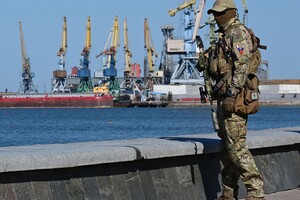The government is solving the problem of how to survive the occupation, but not become a collaborator.

The Cabinet of Ministers submitted to the Verkhovna Rada for consideration the draft law “On Amendments to the Law of Ukraine “On Ensuring the Rights and Freedoms of Citizens and the Legal Regime in the Temporarily Occupied Territory of Ukraine” regarding the Peculiarities of Activities in the Temporarily Occupied Territory of Ukraine”, which legalizes certain types of activities in the occupation.< /p>
Read also: Ukrposhta stops work in non-controlled territories
Currently, a map of the draft law has been created on the website of the parliament, but the text of the document is not available. It is noted that the project has been submitted for consideration by the leadership of the Verkhovna Rada.
In general terms, the text of the draft law was revealed by the representative of the government in the parliament, the head of the secretariat of the faction “Servant of the People” Taras Melnychuk.
According to his report, the Cabinet of Ministers proposes to define a list of activities and measures that can be carried out in the temporarily occupied territories, if at the same time there is no assistance to the aggressor state.
Read also : Russians steal money that residents of occupied territories pay for electricity
At the same time, it is envisaged to empower the CMU, the National Bank of Ukraine and independent regulators to determine the specifics and establish restrictions on the implementation by business entities of a specified list of types of activities. This will make it possible to react promptly and limit certain types of activities or measures in the event of changes in the situation.
We would like to remind you that in March of this year, criminal liability for collaborative activities was introduced in Ukraine. and assistance to the aggressor state. According to the legislation, the conduct of economic activity in cooperation with representatives of the aggressor state is punishable by a fine of up to 170,000 hryvnias to imprisonment for a term of up to 5 years.
Read also: Education in temporarily occupied territories: problems of teachers and schoolchildren
However, formally criminal liability could people who are forced to work in the occupation fall under.
The Ministry of Reintegration started receiving hundreds of appeals: people ask to clarify whether this or that activity falls under the criminal code.
Read also: OCCUPIED. Social obligations of the state in the old and new temporarily occupied territories. To pay or not to pay?
In response to this, the Ministry formed a working group of more than 160 representatives of authorities, businesses, legal experts, and public organizations, which developed two draft laws that make it clear which activities are not collaborationism. In particular, it is clarified that only the voluntary implementation of economic activity in cooperation with the aggressor will be punished. It is also proposed to determine the list of activities that are allowed on the TOT, if the aggressor is not assisted. The government will be able to set specifics and additional restrictions on the conduct of such activities.
The Cabinet of Ministers supported the initiative of the Ministry of Reintegration.
Read also: OCCUPIED: Local self-government under the pressure of the aggressor
We remind you that residents of occupied territories and territories where hostilities continue can submit an application online on granting or renewing the status of unemployed and assigning monetary assistance.
At the same time, PrivatBank blocked the salary and pension cards of clients in the occupation. This is reported by the residents of the occupied territories.
Read also: OCCUPIED: How journalists in the occupied territories keep a blow from Russia
Related video




